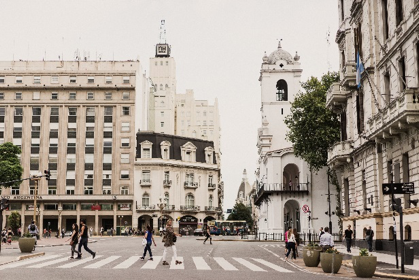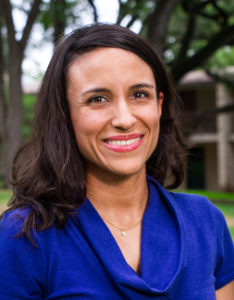 Years ago, I was on an airplane headed to Buenos Aires, Argentina during my doctoral program. The purpose of this trip was to initiate the conversation of our university adding a satellite campus. My professor and I were going to give a workshop in front of a crowd of professionals within the community to present information about our university and Clinical Mental Health curriculum. The hope was to establish a counseling degree in Argentina. I remember terror washing over me thinking about the feeling of standing in front of people. I questioned myself: “Why exactly am I going to Argentina?” My thoughts were interrupted when the flight attendant announced that the flight was going to take “10 hours and forty minutes to get there.” We were flying overnight and in theory, everyone would be sleeping. Of course, I didn’t sleep, I was having a crisis. I wasn’t quite sure what was sending me into panic mode, except that I remember feeling lost. I blamed my nerves on the fear of presenting and stress of flying…needless to say, that flight felt like an eternity.
Years ago, I was on an airplane headed to Buenos Aires, Argentina during my doctoral program. The purpose of this trip was to initiate the conversation of our university adding a satellite campus. My professor and I were going to give a workshop in front of a crowd of professionals within the community to present information about our university and Clinical Mental Health curriculum. The hope was to establish a counseling degree in Argentina. I remember terror washing over me thinking about the feeling of standing in front of people. I questioned myself: “Why exactly am I going to Argentina?” My thoughts were interrupted when the flight attendant announced that the flight was going to take “10 hours and forty minutes to get there.” We were flying overnight and in theory, everyone would be sleeping. Of course, I didn’t sleep, I was having a crisis. I wasn’t quite sure what was sending me into panic mode, except that I remember feeling lost. I blamed my nerves on the fear of presenting and stress of flying…needless to say, that flight felt like an eternity.
Everything ended up going well in Argentina. The group of professionals consisted of psychoanalysts, clergy, and psychiatrists. (From what I was informed, psychoanalysis is still the most used counseling approach in Argentina). We held the workshop, drank café corto with delicious cookies at a local café, and watched tango in the Plaza de Mayo. We flew back four days later, and it was the first trip I didn’t photograph. I don’t know why I didn’t capture this trip but I do remember it being etched in my soul…slowly I was being formed into something I would revisit in the future.
Finally listening to a call…faraway
After my trip, I spent my time developing a curriculum for Latin America, ranging from researching international supervision, introducing theoretical orientations different from traditional psychoanalytic approaches, and figuring out ways to use virtual communication methods to hold classes. I met with professors, the academic dean, and spent countless hours researching peer-reviewed articles on successful counseling programs abroad. Unfortunately, the university did not end up opening a satellite program in Argentina, but it allowed for a seed to be planted. It was becoming clear to me that my call was related to the counseling profession and discussing cultural competency. Important questions surfaced for me including: how do we foster cultural awareness in counseling students graduating from their programs? What are different counseling approaches we can learn in order to increase cultural sensitivity? Lastly, how do we encourage counselors to examine their personal biases about diverse populations? These questions framed my experience and what I believe helped drive my passion for the work I do today.
At the end of my doctoral program, I received a phone call from my colleague Gena Minnix, and now counseling professor at the seminary. She and I had studied together and got to know each other through the Jean Baker-Miller Institute. She called me to invite me to apply for a position in the counseling program with the hopes of applying for CACREP accreditation. In addition, part of the position would include exploring a Latino/Hispanic initiative for our counseling students. Again, I felt in my gut the same feeling I had on that airplane in Argentina.
The Development of the Latino/Hispanic Counseling Concentration (LHCC)
Now two years into my career since that phone call, we received CACREP accreditation and in the process of implementing a Latino/Hispanic Counseling Concentration (LHCC). The LHCC was developed with the vision that the Latino/Hispanic community would be served by curious, culturally empathic, accepting, self-aware graduates of the Clinical Mental Health program. The concentration includes six components: a differentiated curriculum, language proficiency, community collaboration project, a theories workshop, and field experience. In brainstorming ways to create meaningful objectives, we felt it was appropriate to follow a set of outcomes outlined by CACREP. The hope is for our students to:
- Demonstrate understanding of multicultural and pluralistic characteristics within and among diverse groups nationally and internationally, an understanding of theories and models of multicultural counseling, cultural identity development, and social justice and advocacy, and an understanding of multicultural counseling competencies (CACREP 2.F.2.a, b, c).
- Demonstrate and apply strategies for identifying and eliminating barriers, prejudices, and processes of intentional and unintentional oppression and discrimination (CACREP 2.F.2.h).
- Display the ability to self-reflect on the impact of one’s own heritage, attitudes, beliefs, understandings, and acculturation experiences on one’s view of others (CACREP 2.F.2.d).
We felt that these three outcomes would guide our faculty and students to have a deeper understanding of the Latino/Hispanic community. I’ve been excited to see this process unfold and I look forward to the future of our concentration in finding ways to better equip our students. Developing this concentration with my colleagues has also inspired me to continue to evolve and learn how to increase cultural awareness within my personal life.
I truly believe that my trip to Argentina was an important marker in my life and professional development. Somehow, walking the streets of Buenos Aires became the platform for something much larger than I had imagined. I sometimes look back at my experience and ask, “what if I hadn’t paid attention to that experience? Would I be doing what I’m doing now?” I’d like to ask you to reflect on similar questions:
- What call do you need to answer? (Alternatively, what call are you avoiding?)
- What currently makes you feel alive?
- What can you do on a daily basis to nurture that call?
 Stephanie Ramirez completed her Ph.D. at St. Mary’s University in San Antonio, Texas. Her doctorate is in Counselor Education and Supervision (CES) with a specialization in Relational Cultural Theory (RCT) and Social Justice. The emphasis of her doctoral studies can be summed up in her dissertation title, Beyond the U.S.: A Qualitative Study on the Impact of Travel Abroad for Female Counselor Education and Supervision Students. Outside of teaching, Stephanie is a Licensed Professional Counselor (LPC) and National Certified Counselor (NCC). She has counseled clients in a variety of settings including providing counseling and advocacy services for undocumented women experiencing domestic violence, worked with senior adults and caregivers, and has recently worked with at-risk youth. Her research interests include counseling outside of U.S. borders, social justice and multicultural awareness and diversity. She has taught counseling courses in St. Mary’s University Latin American program and has traveled to Mexico and Argentina to help extend counseling opportunities for students outside of the U.S. She has also presented on a variety of topics including keeping ethics relevant in the field of counseling, attitudes and perceptions of Latina Sexuality, LGBT youth and the coming out process, and mobile home culture.
Stephanie Ramirez completed her Ph.D. at St. Mary’s University in San Antonio, Texas. Her doctorate is in Counselor Education and Supervision (CES) with a specialization in Relational Cultural Theory (RCT) and Social Justice. The emphasis of her doctoral studies can be summed up in her dissertation title, Beyond the U.S.: A Qualitative Study on the Impact of Travel Abroad for Female Counselor Education and Supervision Students. Outside of teaching, Stephanie is a Licensed Professional Counselor (LPC) and National Certified Counselor (NCC). She has counseled clients in a variety of settings including providing counseling and advocacy services for undocumented women experiencing domestic violence, worked with senior adults and caregivers, and has recently worked with at-risk youth. Her research interests include counseling outside of U.S. borders, social justice and multicultural awareness and diversity. She has taught counseling courses in St. Mary’s University Latin American program and has traveled to Mexico and Argentina to help extend counseling opportunities for students outside of the U.S. She has also presented on a variety of topics including keeping ethics relevant in the field of counseling, attitudes and perceptions of Latina Sexuality, LGBT youth and the coming out process, and mobile home culture.

